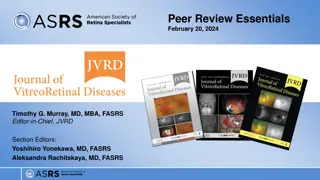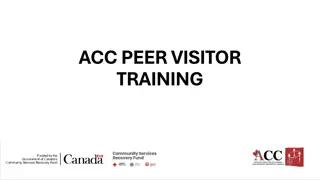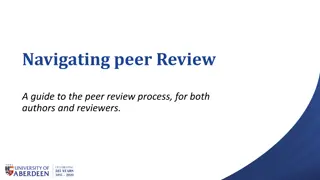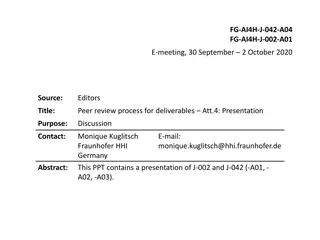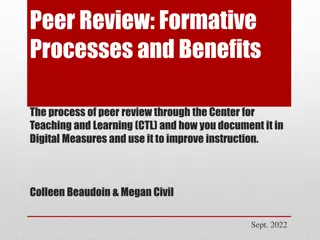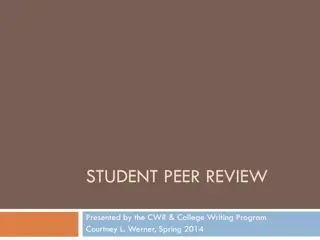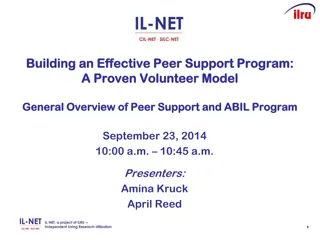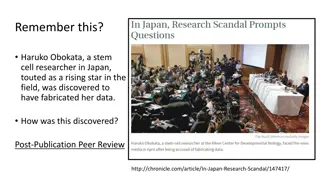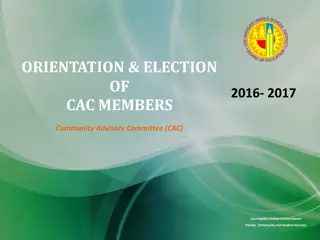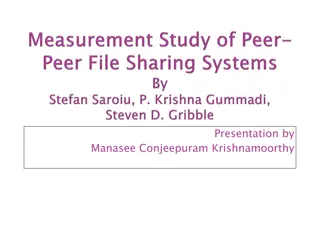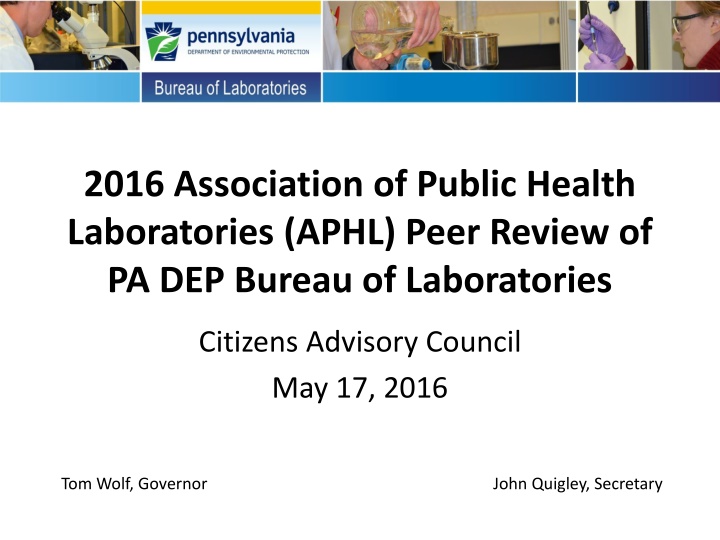
Critical Assessment of PA DEP Bureau of Laboratories
"Explore the in-depth peer review conducted by the Association of Public Health Laboratories (APHL) on Pennsylvania's Department of Environmental Protection (PA DEP) Bureau of Laboratories in 2016, examining strengths, weaknesses, and improvements made since 2011. Learn about the unique testing services, successes, and evolving quality standards of the laboratory, crucial for public health and environmental protection in the Commonwealth."
Download Presentation

Please find below an Image/Link to download the presentation.
The content on the website is provided AS IS for your information and personal use only. It may not be sold, licensed, or shared on other websites without obtaining consent from the author. If you encounter any issues during the download, it is possible that the publisher has removed the file from their server.
You are allowed to download the files provided on this website for personal or commercial use, subject to the condition that they are used lawfully. All files are the property of their respective owners.
The content on the website is provided AS IS for your information and personal use only. It may not be sold, licensed, or shared on other websites without obtaining consent from the author.
E N D
Presentation Transcript
2016 Association of Public Health Laboratories (APHL) Peer Review of PA DEP Bureau of Laboratories Citizens Advisory Council May 17, 2016 Tom Wolf, Governor John Quigley, Secretary
Background 2011 APHL Peer Review Laboratories Strengths and Weaknesses Staffing Reduction Impacts Since 2011 Review Recommendations
APHL Peer Review A three-member APHL team conducted the site review: Dr. Megan Latshaw, APHL s Director of Environmental Health; Dr. Michael Wichman, Environmental Laboratory Director at the University of Iowa State Hygienic Laboratory Environmental Health Division; and Ms. Pandora Ray, APHL s Director of the National Center for Public Health Laboratory Leadership.
Peer Review Scope The primary objectives were to identify: organizational strengths and weaknesses that may have been impacted by budget deficits and staff reductions whether core laboratory functions and policies continue to assure public health, environmental protection, and fiscal responsibility to the Commonwealth of Pennsylvania, the Department of Environmental Protection, and other laboratory clients served
Findings The BOL is a critical asset to the Commonwealth of PA and stands above many other laboratories with whom APHL works. Examples of Unique Testing: TENORM Study, Cryptosporidium, Fish Eating Advisories, Gross Alpha & Beta Testing in Drinking Water High Quality Work and Accreditation
2016 Peer Review Successes since 2011 Report Development of COOP EPA Data Exchange Grant Update to LIMS Partnership with University Implementation of New Technologies
2016 Peer Review Since the review in 2011, however, the laboratory has moved from exceptional to adequate The laboratory has maintained their accreditation and continues to have a reputation for high-quality work Senior leadership is transparent about decisions, accesses to the staff s concerns, empathizes with them, puts on lab coats to help, and develops creative solutions
Critical Recommendations Return to 2011 staffing levels. Collaborate with HR to develop a plan for: Making salary and benefits more equitable for managers. Making civil service designations more equitable across the DEP. Look into streamlining the overtime system as a temporary measure until staffing levels are sufficient. Consider a blanket approval during busy times. Pursue designation by the Commonwealth as a critical asset that cannot be shut down in the event of a budget impasse. Recommending that the BOL develop a strategic plan for the lab, outlining the next three years what has to happen and how to get there. As part of that process, develop a vision for what the ideal laboratory would look like and what it would do. Continue working closely with programs and encouraging them to use the laboratory s services (as capacity allows). Replace the neutralization system due to safety and efficiency concerns.
Other Recommendations Keep a list of projects that the lab turns down or grants for which they cannot apply due to staffing constraints. Develop exit interviews and a knowledge transfer process for when people leave. Expanding the COOP to include loss of use of the existing building. A LEAN assessment may identify unrealized efficiencies, although given the high workload of staff, it might be difficult to find time and resources to complete. Develop a process for programs to print barcoded labels with testing information. Do outreach to critical partners and clients to understand their needs and concerns (maybe a survey or focus group). Develop a long-term plan for staffing the LC/MS/MS to give laboratory capability to do PFCs, hormones, toxins (including cyanotoxins).
Overall Review The DEP BOL is overall, a well-managed, efficient, and highly functional laboratory and excellence in staff. Impressive organizational culture using of cross-training staff to meet seasonal or emergency situations that may result in a surge of samples. The quality management system is embedded in their work and operational processes which assures a high degree of proficiency and quality of the work output and is reflected in their accreditation status under NELAP. BOL is driven by a culture of customer service and appears to meet customer needs despite significant reductions in staff over the past several years.
Real Time Example of Concerns Pittsburgh Water and Sewer Authority Investigation of Lead in Drinking Water Emergency Overtime for Backlogs and Holding Times
Message to Citizen Advisory Council The critical concern with reduced staffing in the Peer Review reflects the overall concern for the staffing level with the entire DEP agency and our ability to perform basic functions in a timely fashion stressing us to our limits to protect public health and the environment. Running a Marathon at a Sprinter s Pace Staff are at a breaking point Concern for losing accreditation
Dr. Martina Q. McGarvey Director, Bureau of Laboratories mmcgarvey@pa.gov

